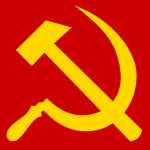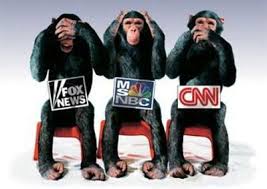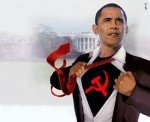Comrade Mandela’s Secret Life at US Action News
9 years ago

What was he trying to hide? And was there more to it than mere membership in the SACP?
By Cliff Kincaid
The South African Communist Party is admitting Nelson Mandela was a high-ranking member. Will the media report these facts? Or will the “myth” continue to prevail?
My friend Victor Lasky used to write books about liberal or left-wing figures that carried the name of the person and the subtitle, “The Man and the Myth.” He would compare the coverage of a political figure with the truth. The coverage of the death of Nelson Mandela has focused mostly on the myth. Key facts are being omitted, including Mandela’s secret membership in the South African Communist Party (SACP), which may shed light on the future of South Africa.
It’s very rare in all of the coverage, from Fox News to MSNBC, to find any reference to the central role that communism played in Mandela’s life. The evidence shows not only that he was a secret member of the South African Communist Party, but that he continued to deny membership in the party throughout his life. The cover-up is relevant to South Africa’s future and the role the SACP plays in the current government.
Mandela is being credited with trying to avoid a bloodbath after the black majority took power. But his denial of membership in the South African Communist Party, which turned out to be a lie, deserves attention and comment. What was he trying to hide? And was there more to it than mere membership in the SACP?
The SACP itself is not hiding the truth. In a tribute to “a true  revolutionary,” its website declares, “At his arrest in August 1962, Nelson Mandela was not only a member of the then underground South African Communist Party, but was also a member of our Party’s Central Committee. To us as South African communists, Cde [Comrade] Mandela shall forever symbolize the monumental contribution of the SACP in our liberation struggle. The contribution of communists in the struggle to achieve the South African freedom has very few parallels in the history of our country. After his release from prison in 1990, Cde Madiba became a great and close friend of the communists till his last days.”
revolutionary,” its website declares, “At his arrest in August 1962, Nelson Mandela was not only a member of the then underground South African Communist Party, but was also a member of our Party’s Central Committee. To us as South African communists, Cde [Comrade] Mandela shall forever symbolize the monumental contribution of the SACP in our liberation struggle. The contribution of communists in the struggle to achieve the South African freedom has very few parallels in the history of our country. After his release from prison in 1990, Cde Madiba became a great and close friend of the communists till his last days.”
As president of South Africa, Mandela spoke to the South African Communist Party on its 75th anniversary, referring to its “alliance” with the African National Congress and others ruling South Africa.
Some of the truth about Mandela’s secret life as a communist has emerged in various books over the years.
In Mandela: The Authorized Biography, Anthony Sampson writes that Mandela started out as an anti-communist but “was impressed by The Communist Manifesto and by the biographies of South African Marxists like Paul Bunting and Bill Andrews.” Sampson went on to write, “He was struck by the Soviet Union’s support for liberation movements throughout the world, and by the relentless logic of dialectical materialism, which he felt sweeping away the superstitions and inherited beliefs of his childhood…” One of those beliefs was Christianity, and Sampson writes that Mandela “experienced some pangs at abandoning the Christian beliefs that had fortified his childhood…”
A photo in the book shows Mandela and his second wife, Winnie, at a 1958 wedding ceremony “attended by a few close friends, including the communist writer Michael Harmel.”
Harmel “joined our Party in 1939 and for the rest of his life the Party was his master,” states a tribute on the website of the South African Communist Party. It goes on, “As a dedicated internationalist he saw anti-Sovietism as a deadly weapon of the most reactionary circles; a weapon which imperialism, and its ally Zionism, use in their frenzied efforts to undermine and disrupt the underlying unity of national liberation movements and the Socialist countries…”
Mandela, Sampson wrote, studied communist revolution. “But it was the Cuban revolution which most inspired him and many of his colleagues.”
Sampson says that Mandela “recruited” Joe Slovo to Umkhonto we Sizwe (MK), the armed wing of the African National Congress, for a “campaign of sabotage” in South Africa. Slovo, in turn, “brought in a small group of communist experts” who knew about explosives. Slovo, a white communist, was dubbed “the KGB colonel” by those who considered him an agent or member of Soviet intelligence.
In the 2010 book Young Mandela: The Revolutionary Years, David James Smith writes about Mandela being “present at a secret meeting of the Communist Party in December 1960 when it decided to begin its own armed struggle, six months before Mandela even raised the subject with the ANC [African National Congress].” In 1961, he continued, the South African Communist Party “was still accepting funds from Moscow, using a Johannesburg travel agent as a conduit for the money. Mandela himself never fled from communism, though neither does it appear he was ever actually a party member…” He added, “One or two people have claimed he actually joined the party but Mandela himself always denied it…There is no doubt, however, that Mandela embraced communism and communists, considering them among his closest friends and political allies…”
Stephen Ellis, author of the 2012 book, External Mission, found minutes of an SACP meeting at which a member of the central committee, John Motshabi, reminisced about Mandela’s recruitment. He also reported, “Evidence of Mandela’s SACP membership includes his participation in the Party’s December 1960 conference, where the decision was made to launch the organization later known as Umkhonto we Sizwe. Furthermore, at least seven prominent members of the SACP, in addition to Joe Mathews, have testified to Mandela’s party membership.”
Now, of course, we have the SACP itself admitting Mandela’s membership in the party and its important central committee.
But that’s not the message Mandela himself was sending just a few years ago.
President Barack Obama wrote the foreword to the 2010 book, Nelson: Conversations with Myself, by Mandela. The book includes dialogue with Richard Stengel, the former editor of Time magazine who is going to work full-time at the Obama State Department. Mandela once again denied being a Communist Party member or being sympathetic to communism in any way. He told Stengel he had been “anti-communist” and only went to the SACP meetings because he was “invited.” He said he “attacked the communists,” and “I thought Marxism was something that actually was subjecting us to a foreign ideology.”
Now we know all of this was a lie, designed to fool foreign audiences  and create the myth of Mandela. Our media have been part of the deception. Will they now correct the record and tell the truth before the communists acquire even more power in South Africa?
and create the myth of Mandela. Our media have been part of the deception. Will they now correct the record and tell the truth before the communists acquire even more power in South Africa?
Interestingly, President Obama used the foreword to describe Mandela as “a liberation figure” who worked for “equality, opportunity and human dignity.” But he said Mandela had acknowledged “that he has not been a perfect man” and had “his flaws.” Obama says the lesson is that we have to be “honest with ourselves” in the personal and political realms.
 Clearly, Mandela was not honest with the public about his deep involvement with communism, including membership in the South African Communist Party. Then, again, Obama was never honest with the American people about his mentor, Communist Party operative Frank Marshall Davis, a member of the Soviet espionage apparatus in Hawaii.
Clearly, Mandela was not honest with the public about his deep involvement with communism, including membership in the South African Communist Party. Then, again, Obama was never honest with the American people about his mentor, Communist Party operative Frank Marshall Davis, a member of the Soviet espionage apparatus in Hawaii.
Do we see a pattern developing here?
Cliff Kincaid is the Director of the AIM Center for Investigative Journalism, and can be contacted at cliff.kincaid@aim.org.
Also please consider:
Help Make A Difference By Sharing These Articles On Facebook, Twitter And Elsewhere:
